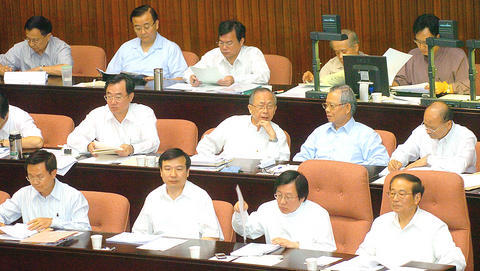The Bureau of Energy has begun to promote its campaign to achieve greater energy efficiency and cut annual greenhouse gas emissions by more than 420,000 tonnes by 2011.
The campaign encourages people to dress lightly to cope with the summer heat and set their air conditioners between 26oC and 28oC to save power, the bureau said in a statement yesterday.
Earlier this week, Premier Chang Chun-hsiung (張俊雄) ordered Cabinet ministers and government and education officials not to wear suits and ties in summer.

PHOTO: LO PEI-DER, TAIPEI TIMES
Taiwan has company in its quest to save energy and fight global warming.
Yesterday, for instance, Japan formally kicked off its third summer "Cool Biz" casual clothing drive as politicians wore short-sleeved shirts to work.
By turing the temperature of air conditioners up 1oC, the nation's electricity consumption will be reduced by 6 percent, the bureau said, citing a study by local market researcher Industrial Technology Research Institute (ITRI, 工研院).
To prevent wasting energy, retailers should install air shades in entrances and exits to prevent 70 percent to 90 percent of the cool air inside their stores from leaking, the energy bureau said.
Another measure that can be taken to save power is enhancing the energy efficiency of electronics and home appliances. Annual electricity consumption could be cut by 130 million kilowatt hours if the efficiency of light bulbs ballasts was raised by 30 percent, the bureau said.
The government also plans to save 170 million kilowatt hours of electricity per year by replacing incandescent light bulbs with energy-saving designs from 2010.
By 2011, home appliances such as air conditioners, dehumidifiers, refrigerators and heaters will be required to meet energy efficiency standards set by the government.
The government expects the standards to save 620 million kilowatt hours of electricity, or 42 tonnes of carbon dioxide, each year, the statement said.
To increase public awareness of environmental issues, the energy bureau encouraged consumers to sign up for the energy saving campaign on its Web site.
The energy bureau will also sign a declaration on Tuesday with businesses -- including Cathay Financial Holding Co (國泰金控) and Chi Mei Frozen Food Co (奇美食品) -- and associations like the Chinese National Federation of Industries (全國工總) to join in the energy saving drive, the bureau said in the statement.
Meanwhile, state-run Taiwan Power Co (Taipower,
Household users, retailers and hospitals in the highest power-consumption bracket will pay 28.97 percent more this month, the company said.
The bills of small and medium-sized businesses and factories will be increased by 36 percent in summer, Taipower said.
Taipower predicted consumption this summer would surpass the record 32.06 million kilowatt hours consumed last summer.
If every air conditioner in Taiwan was turned up by 1oC, electricity consumption would be reduced by 300 million kilowatt hours this summer, the company estimated.

On Tuesday, US President Donald Trump weighed in on a pressing national issue: The rebranding of a restaurant chain. Last week, Cracker Barrel, a Tennessee company whose nationwide locations lean heavily on a cozy, old-timey aesthetic — “rocking chairs on the porch, a warm fire in the hearth, peg games on the table” — announced it was updating its logo. Uncle Herschel, the man who once appeared next to the letters with a barrel, was gone. It sparked ire on the right, with Donald Trump Jr leading a charge against the rebranding: “WTF is wrong with Cracker Barrel?!” Later, Trump Sr weighed

Taiwan Semiconductor Manufacturing Co (TSMC, 台積電) secured a record 70.2 percent share of the global foundry business in the second quarter, up from 67.6 percent the previous quarter, and continued widening its lead over second-placed Samsung Electronics Co, TrendForce Corp (集邦科技) said on Monday. TSMC posted US$30.24 billion in sales in the April-to-June period, up 18.5 percent from the previous quarter, driven by major smartphone customers entering their ramp-up cycle and robust demand for artificial intelligence chips, laptops and PCs, which boosted wafer shipments and average selling prices, TrendForce said in a report. Samsung’s sales also grew in the second quarter, up

HEADWINDS: Upfront investment is unavoidable in the merger, but cost savings would materialize over time, TS Financial Holding Co president Welch Lin said TS Financial Holding Co (台新新光金控) said it would take about two years before the benefits of its merger with Shin Kong Financial Holding Co (新光金控) become evident, as the group prioritizes the consolidation of its major subsidiaries. “The group’s priority is to complete the consolidation of different subsidiaries,” Welch Lin (林維俊), president of the nation’s fourth-largest financial conglomerate by assets, told reporters during its first earnings briefing since the merger took effect on July 24. The asset management units are scheduled to merge in November, followed by life insurance in January next year and securities operations in April, Lin said. Banking integration,

LOOPHOLES: The move is to end a break that was aiding foreign producers without any similar benefit for US manufacturers, the US Department of Commerce said US President Donald Trump’s administration would make it harder for Samsung Electronics Co and SK Hynix Inc to ship critical equipment to their chipmaking operations in China, dealing a potential blow to the companies’ production in the world’s largest semiconductor market. The US Department of Commerce in a notice published on Friday said that it was revoking waivers for Samsung and SK Hynix to use US technologies in their Chinese operations. The companies had been operating in China under regulations that allow them to import chipmaking equipment without applying for a new license each time. The move would revise what is known